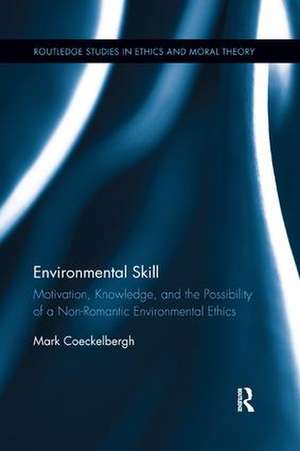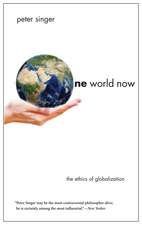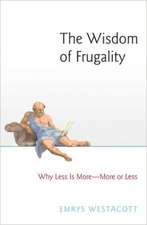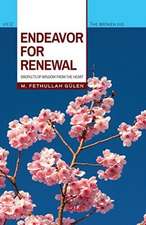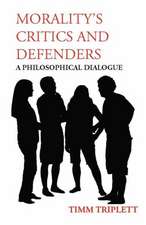Environmental Skill: Motivation, Knowledge, and the Possibility of a Non-Romantic Environmental Ethics: Routledge Studies in Ethics and Moral Theory
Autor Mark Coeckelberghen Limba Engleză Paperback – 14 aug 2018
| Toate formatele și edițiile | Preț | Express |
|---|---|---|
| Paperback (1) | 408.29 lei 6-8 săpt. | |
| Taylor & Francis – 14 aug 2018 | 408.29 lei 6-8 săpt. | |
| Hardback (1) | 1037.72 lei 6-8 săpt. | |
| Taylor & Francis – 4 mar 2015 | 1037.72 lei 6-8 săpt. |
Din seria Routledge Studies in Ethics and Moral Theory
-
 Preț: 311.06 lei
Preț: 311.06 lei -
 Preț: 313.72 lei
Preț: 313.72 lei -
 Preț: 716.42 lei
Preț: 716.42 lei -
 Preț: 311.51 lei
Preț: 311.51 lei -
 Preț: 311.41 lei
Preț: 311.41 lei -
 Preț: 309.50 lei
Preț: 309.50 lei - 9%
 Preț: 936.26 lei
Preț: 936.26 lei - 9%
 Preț: 934.94 lei
Preț: 934.94 lei -
 Preț: 310.60 lei
Preț: 310.60 lei -
 Preț: 311.48 lei
Preț: 311.48 lei -
 Preț: 295.33 lei
Preț: 295.33 lei - 18%
 Preț: 1035.38 lei
Preț: 1035.38 lei - 18%
 Preț: 1093.77 lei
Preț: 1093.77 lei - 18%
 Preț: 1036.14 lei
Preț: 1036.14 lei - 18%
 Preț: 1087.33 lei
Preț: 1087.33 lei - 18%
 Preț: 1040.25 lei
Preț: 1040.25 lei - 18%
 Preț: 1094.79 lei
Preț: 1094.79 lei -
 Preț: 409.25 lei
Preț: 409.25 lei - 26%
 Preț: 820.32 lei
Preț: 820.32 lei - 18%
 Preț: 1100.95 lei
Preț: 1100.95 lei -
 Preț: 376.08 lei
Preț: 376.08 lei - 26%
 Preț: 846.92 lei
Preț: 846.92 lei -
 Preț: 466.74 lei
Preț: 466.74 lei -
 Preț: 432.42 lei
Preț: 432.42 lei - 18%
 Preț: 983.38 lei
Preț: 983.38 lei -
 Preț: 405.46 lei
Preț: 405.46 lei - 18%
 Preț: 1039.55 lei
Preț: 1039.55 lei - 18%
 Preț: 1033.80 lei
Preț: 1033.80 lei -
 Preț: 428.83 lei
Preț: 428.83 lei - 26%
 Preț: 762.57 lei
Preț: 762.57 lei -
 Preț: 453.93 lei
Preț: 453.93 lei - 26%
 Preț: 848.57 lei
Preț: 848.57 lei -
 Preț: 409.25 lei
Preț: 409.25 lei - 18%
 Preț: 1090.44 lei
Preț: 1090.44 lei - 18%
 Preț: 1087.26 lei
Preț: 1087.26 lei - 26%
 Preț: 820.40 lei
Preț: 820.40 lei - 26%
 Preț: 763.39 lei
Preț: 763.39 lei -
 Preț: 475.11 lei
Preț: 475.11 lei - 26%
 Preț: 764.20 lei
Preț: 764.20 lei - 18%
 Preț: 1091.24 lei
Preț: 1091.24 lei -
 Preț: 441.89 lei
Preț: 441.89 lei - 18%
 Preț: 1037.72 lei
Preț: 1037.72 lei - 26%
 Preț: 848.31 lei
Preț: 848.31 lei -
 Preț: 474.43 lei
Preț: 474.43 lei -
 Preț: 424.54 lei
Preț: 424.54 lei
Preț: 408.29 lei
Nou
Puncte Express: 612
Preț estimativ în valută:
78.16€ • 80.39$ • 64.84£
78.16€ • 80.39$ • 64.84£
Carte tipărită la comandă
Livrare economică 19 februarie-05 martie
Preluare comenzi: 021 569.72.76
Specificații
ISBN-13: 9781138346758
ISBN-10: 1138346756
Pagini: 244
Ilustrații: 1 Halftones, black and white
Dimensiuni: 152 x 229 x 13 mm
Greutate: 0.43 kg
Ediția:1
Editura: Taylor & Francis
Colecția Routledge
Seria Routledge Studies in Ethics and Moral Theory
Locul publicării:Oxford, United Kingdom
ISBN-10: 1138346756
Pagini: 244
Ilustrații: 1 Halftones, black and white
Dimensiuni: 152 x 229 x 13 mm
Greutate: 0.43 kg
Ediția:1
Editura: Taylor & Francis
Colecția Routledge
Seria Routledge Studies in Ethics and Moral Theory
Locul publicării:Oxford, United Kingdom
Public țintă
Postgraduate and UndergraduateCuprins
1. Introduction Part I: Environmental Motivation and Knowledge: Ancient and Modern Lessons from Philosophy and Psychology 2. The Moral Psychology of Environmental "Sin" 3. Lessons from Contemporary Psychology Part II: The Janus Face of Modern Environmentalism: Enlightenment and Romanticism 4. Enlightenment Reason and Liberation Politics 5. Romantic Feeling for Nature Part III: Beyond, Nature, beyond Modernity, beyond Thinking: A Non-Romantic, Non-Modern Approach 6. Beyond "Nature" and Modernity: Towards Non-Dualistic Thinking 7. Beyond Environmental Thinking (1): Skilled Engagement 8. Beyond Environmental Thinking (2): Exercising Virtue and Moral Sentiment Part IV: Implications for Environmental Ethics and Philosophy of Technology 9. Implications for Environmental Ethics (1): Beyond Walking in "Nature" 10. Implications for Environmental Ethics (2): Exploring the Possibility of Non-Modern and Non-Romantic Environmental Living 11. The Art of Environmental Practice as an Ethics of Skill: Revisiting the Problem of Technology and its Relation to Alienation 12. Conclusion: The Possibility of a New Environmental Ethics
Recenzii
"Coeckelbergh’s book stands as a reminder that practicing environmental philosophy always means relating to one’s environment in a certain way and that questioning and skillfully dealing with this relation remains an ongoing task." - Jochem Zwier, Human Studies Journal
"A much-needed fresh approach to the environmental concerns of the average person." —Ladelle McWhorter, University of Richmond, USA
"Environmental ethics often seeks to develop a suitably modern solution to the problems imposed by modernity—solutions rooted in enlightenment thinking and romanticism. Mark Coeckelbergh’s Environmental Skill takes an entirely different approach, demonstrating that it is modernity that is the problem and developing an innovative form of environmental ethics that relies not on better knowledge about the world but more attentive and skill ways of being-in-the-world." —David J. Gunkel, Northern Illinois University, USA
"This new book by Mark Coeckelbergh is an insightful argument for an environmental philosophy that draws on the resources of and at the same time extends work in philosophy of technology. The notion of skilled engagement with the world as this has emerged from pragmatism and phenomenology is here deepened and re-thought in an effort to understand and respond to the challenges of living in a techno-transformed nature." —Carl Mitcham, Colorado School of Mines, USA
"Coeckelbergh’s book stands as a reminder that practicing environmental philosophy always means relating to one’s environment in a certain way and that questioning and skillfully dealing with this relation remains an ongoing task." —Jochem Zwier, Human Studies Journal
"There is much for contemporary environmentalists to find compelling about Coeckelbergh's account, being not only an interesting analysis of the factors at work in motivation but also a convincing and optimistic approach to the problem...It is a welcome and interesting addition to a field in need of voices focused on bringing about meaningful, practical change." —Tara Kennedy, Notre Dame Philosophical Reviews
"Even if highly condensed, the breadth of scope and the use of an impressive body of literature from different disciplines and subfields well beyond his own core field of expertise, which is technological and environmental ethics, clearly merits praise. (...) Coeckelbergh has indeed provided a valuable and stimulating stepping-stone to this end." - Francis Van den Noortgaete, KU Leuven in Ethical Perspectives
"A much-needed fresh approach to the environmental concerns of the average person." —Ladelle McWhorter, University of Richmond, USA
"Environmental ethics often seeks to develop a suitably modern solution to the problems imposed by modernity—solutions rooted in enlightenment thinking and romanticism. Mark Coeckelbergh’s Environmental Skill takes an entirely different approach, demonstrating that it is modernity that is the problem and developing an innovative form of environmental ethics that relies not on better knowledge about the world but more attentive and skill ways of being-in-the-world." —David J. Gunkel, Northern Illinois University, USA
"This new book by Mark Coeckelbergh is an insightful argument for an environmental philosophy that draws on the resources of and at the same time extends work in philosophy of technology. The notion of skilled engagement with the world as this has emerged from pragmatism and phenomenology is here deepened and re-thought in an effort to understand and respond to the challenges of living in a techno-transformed nature." —Carl Mitcham, Colorado School of Mines, USA
"Coeckelbergh’s book stands as a reminder that practicing environmental philosophy always means relating to one’s environment in a certain way and that questioning and skillfully dealing with this relation remains an ongoing task." —Jochem Zwier, Human Studies Journal
"There is much for contemporary environmentalists to find compelling about Coeckelbergh's account, being not only an interesting analysis of the factors at work in motivation but also a convincing and optimistic approach to the problem...It is a welcome and interesting addition to a field in need of voices focused on bringing about meaningful, practical change." —Tara Kennedy, Notre Dame Philosophical Reviews
"Even if highly condensed, the breadth of scope and the use of an impressive body of literature from different disciplines and subfields well beyond his own core field of expertise, which is technological and environmental ethics, clearly merits praise. (...) Coeckelbergh has indeed provided a valuable and stimulating stepping-stone to this end." - Francis Van den Noortgaete, KU Leuven in Ethical Perspectives
Descriere
Discussing the relations between moral motivation, knowledge, and modernity, this book criticizes modern and romantic thinking about "nature" based on abstract reasoning and detached sentiments. It shows how an environmental ethics centered on the concept of environmental skill opens up alternative ways of relating to our environment.
